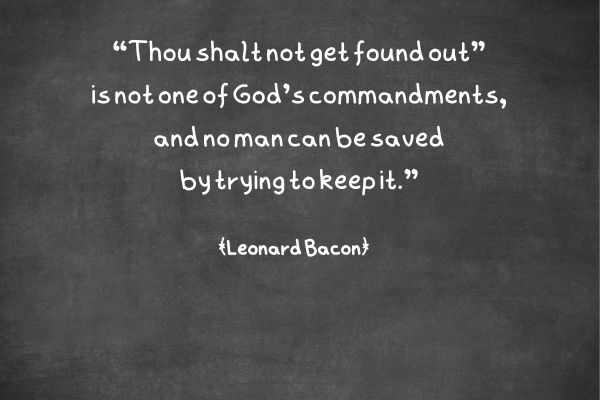What If It Didn’t Matter If You Were “Found Out”?: Authenticity And Perfection In Coaching

Today’s quote is:
“‘Thou shalt not get found out’ is not one of God’s commandments, and no man can be saved by trying to keep it.” (Leonard Bacon)
In the world of coaching, I’ve spoken to many coaches over the years, and it often comes up that they feel an unspoken pressure to project an image of flawlessness. It may manifest as getting in the way of taking a specific action because “what would people think” or your mind is just so busy when it comes to a time when you want to be creative that the ideas just don’t flow. If you recognise that pressure, then maybe it shows up differently for you. Personally, it’s not a pressure that I’ve ever found helpful, and this quote, for me, serves as a powerful reminder that authenticity trumps the pursuit of perfection.
I approach coaching from a perspective that teaches us that our experience of life is created from the inside out, through the interplay of our thoughts, feelings, and perceptions. Embracing this understanding allows both coaches and clients to let go of the need to maintain a façade of perfection and instead embrace their true selves. (Spoiler alert: if you’ve not done this, and fear what you may find – I promise that your true self is not as bad as you fear, in fact I think you will be pleasantly surprised by what you experience.)
In coaching, whether it’s working with individuals, teams, or organisations, authenticity is key to building genuine connections and facilitating meaningful change. When coaches strive to “not get found out,” they are essentially hiding behind a mask, disconnecting themselves from their clients and undermining the trust essential for a fruitful coaching relationship. Clients can sense when a coach is being disingenuous, and this lack of authenticity can hinder progress and impede the coach-client dynamic.
Instead of striving to appear infallible, try embracing our own perceived imperfections and being willing to show up as our authentic selves, flaws and all. By modelling vulnerability, coaches create a safe space for clients to explore their own vulnerabilities and challenges without fear of judgment or shame.
Leonard Bacon’s quote speaks to the futility of trying to maintain a façade of perfection. No one is infallible, and pretending otherwise only serves to create distance and barriers between ourselves and others. In coaching, authenticity fosters genuine connections and allows for deeper exploration and growth. When coaches let go of the need to “not get found out,” they open themselves up to richer, more meaningful coaching experiences. I’ve found that it allows you to be more fully present with your client and fully listening without a lot on my mind.
Moreover, authenticity in coaching extends beyond the coach-client relationship—it also encompasses the coach’s relationship with themselves. When you understand the importance of self-awareness and self-compassion, you can recognise that we are human beings first and coaches second. We, too, are subject to the ebb and flow of our thoughts and feelings, exactly like our clients and all other humans!
By embracing our own authenticity, we lead by example, showing our clients that it’s okay to be imperfect, to make mistakes, and to learn and grow from them. We create an environment where vulnerability is celebrated, not feared, and where true transformation can occur.
In conclusion, Leonard Bacon’s quote serves as a poignant reminder for coaches of all disciplines to prioritise authenticity over the pursuit of perfection. Understanding that authenticity is the cornerstone of effective coaching, fostering trust, connection, and growth can make a significant impact on your coaching relationships. By embracing our imperfections and showing up as our authentic selves, we create space for profound transformation, both for ourselves and for our clients.
So, I leave you with an invitation to consider: What if it didn’t matter if you were ‘found out’? What if clients knew whatever it is you’re afraid they will discover, and still chose to work with you? How would that shift your approach to coaching, and what possibilities might emerge from such liberated authenticity?
About Jen Waller

Jen Waller is on a mission to support, nurture and encourage coaching skills and talents from non-coach to coach and beyond.
As an experienced coach and trainer, Jen is happy to utilise all skills at her disposal to assist clients from getting out of their own way and making a difference in the world with their coaching. Find out more about the support Jen offers here.